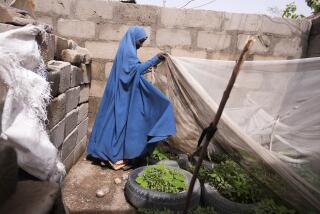Volunteers Live Hard Life in Sand-Parched Mali
TIMBUKTU, Mali — Scattered in the isolated mud-and-thatch villages of central Mali, young Peace Corps workers are teaching the skills of survival in a sand-parched desert nation where 1.2 million people face starvation.
The harsh conditions of the West African nation dominate the lives of the young Americans.
Bitter desert winds blow up so much dust that planes are often grounded for days. The dust resembles a ground fog, obscuring the sun and covering trees, buildings and cars with a fine film.
A day outside leaves hair matted, throats irritated and engines clogged. It is often impossible to see for more than half a mile.
Temperatures soar above 100 at midday, dropping only a few degrees at night. The once-romantic land of deserts, camels, nomads and the fabled city of Timbuktu is today a zone of disease, poverty and desperation.
Peace Corps volunteers in Mali last month received a visitor from home--Vice President George Bush drove over the dirt roads of the poverty-stricken capital of Bamako to visit the organization’s headquarters.
Peace Corps Director Loret Miller Ruppe, 49, flew in with Bush and made an impromptu tour of the isolated Peace Corps workers. She took along a reporter who wanted to view the drought-stricken countryside.
“She wanted to see some of our farthest-flung volunteers,” said U.S. Ambassador Robert Ryan Jr., who drove with Ruppe to Mopti, a town 300 miles northeast of Bamako.
“We believe the drought here over the past three years is the worst in Mali’s recorded history,” Ryan said as his four-wheel-drive vehicle rumbled up the dirt road bordered by a few flat-topped thorn trees.
Mali, three times the size of California, has a population of about 7 million and is the sixth-poorest nation in the world, the United Nations estimates. During his visit to Sudan, Niger and Mali, Bush pledged $115 million in U.S. aid to the nations.
Ruppe stopped in the tiny town of Segou to see Michelle Cramwell, 25, of Kirkland, Ore. The blonde, bespectacled American greeted her visitors wearing a brightly colored, calf-length African dress.
“Wow, is Chernenko dead? Who’s taken over?” asked Cramwell, when told of the news from Moscow. Her radio--her lifeline to the outside world--too often “crackles” to be of much service, she said.
Cramwell volunteered for a third year in Mali after spending two years on a project to help women use more efficient firewood stoves, cutting down the time they spend gathering firewood, a major task in an African woman’s life.
She now works at a special school near Segou, 150 miles north of the capital, teaching women to grow vegetables using as little water as possible. Her own garden of tomatoes, onions and beetroot is an unlikely splash of green against the dry brown landscape.
Cramwell accepted a luxury from Ruppe: shampoo. Still enthusiastic about her life in Mali, she said the only “minor discomfort” is the lack of social life.
“I hardly have much contact with people back at PC headquarters in Bamako. Until you folks came along, I hadn’t spoken English for weeks,” she said. “It’s been Bambara (an African tongue) and to a lesser extent French.”
Several miles away in Niono, a town of round mud huts and a few one-story brick buildings, is another American, Katie Rosch, 22, of Lancaster, Pa., who has been instructing women to use high-efficiency stoves for eight months.
“I’ve still got almost two years to go, but it’s a wonderful challenge,” Rosch said.
“It takes a long time to teach someone about using wood efficiently. I work with the women, I dance with them and I hope some of these basic things get through by word of mouth, by good relations and by the simple fact that someone sees how well someone else is doing.”
The score of volunteers visited within 150 miles of Banako were all chosen through a tough selection process in the United States, then prepared with 13 weeks of training in Mali. They live on $134 a month.
“Our volunteers out here are just young people right on the cutting edge of development,” said Ruppe, examining a wood stove designed for the area.
Cutting down trees for firewood exacerbates the process of “desertification,” the creeping advance of the desert. Ryan said the embassy and the Peace Corps have a highly organized emergency network should something happen to a volunteer.
But last October, Kay Crotty, 24, of Massachusetts died of cerebral malaria. Her death prompted the Peace Corps to insist that all volunteers, who in Mali live on boiled rice, some vegetables and goat or wild fowl, take three kinds of malaria tablets during their stay.
More to Read
Sign up for Essential California
The most important California stories and recommendations in your inbox every morning.
You may occasionally receive promotional content from the Los Angeles Times.










